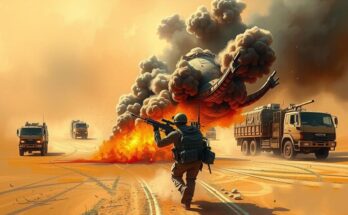The M23 rebel group, supported by Rwanda, has announced a unilateral ceasefire in eastern DRC due to humanitarian concerns. This occurs amid significant fighting resulting in numerous casualties and mass displacements. While the rebels control Goma, they clarified intentions not to seize other key cities. Regional leaders are advocating for peace talks as the situation remains complex due to historical ethnic tensions.
The Rwandan-backed M23 rebel group, which recently captured the strategic city of Goma in the eastern Democratic Republic of the Congo (DRC), announced a unilateral ceasefire primarily for humanitarian purposes. The ceasefire is set to take effect on Tuesday, following an urgent need for safe corridors for humanitarian aid for the numerous displaced individuals amidst ongoing conflict. Amid the unrest, it was reported that 900 people had lost their lives during last week’s clashes in Goma between M23 forces and DRC government troops.
While the city of Goma, which has a population of two million and is rich in mineral resources, remains under rebel control, M23 has gained further ground in eastern DRC and is advancing toward Bukavu. However, the M23 spokesman Lawrence Kanyuka clarified that their intention is not to capture Bukavu and emphasized their goal of protecting civilians. The group has notably expressed aspirations to reach Kinshasa, the national capital located a thousand miles away.
As the ceasefire announcement came ahead of an upcoming summit in the region, leaders from the Eastern and Southern African blocs, including President William Ruto of Kenya, have called for peace talks. The G7 foreign ministers echoed this sentiment, urging the warring parties to engage in negotiations and facilitate unhindered humanitarian relief passages for affected civilians. In response, the DRC authorities indicated their openness to dialogue, contingent upon adherence to previous peace agreements.
The M23 rebels are reportedly supported by approximately 4,000 Rwandan troops, a significant increase compared to their numbers in 2012. They represent the most formidable of over 100 armed groups competing for control in the resource-rich eastern DRC. The ongoing conflict has exacerbated the plight of those already displaced by violence, with many fleeing to neighboring Rwanda. The situation is further complicated by a lengthy ethnic conflict, with M23 claiming to defend ethnic Tutsis in DRC against alleged persecution by Hutu groups that include remnants of the Rwandan genocide perpetrators.
The complexities of the conflict extend beyond borders, as Rwanda asserts that Tutsis face threats from Hutu militias, which have allegedly integrated into the Congolese military, a claim the DRC government disputes. The historical context reveals lingering tensions from the 1994 Rwandan genocide, which continues to influence current dynamics. As the announcement unfolds, regional and international stakeholders are attentive to the ceasefire’s implications and the potential for renewed dialogue.
The situation in the eastern DRC involves multiple actors engaged in a fierce struggle for territorial control and influence, rooted in a complex history marked by ethnic tensions dating back to the Rwandan genocide of 1994. The M23 rebel group has emerged as a significant force, backed by Rwanda amidst ongoing accusations against the DRC government of failing to honor peace agreements. The region is not only strategically important due to its mineral wealth but also a hotspot for various armed groups and humanitarian crises stemming from years of conflict and displacement.
In conclusion, the unilateral ceasefire declared by the M23 rebels marks a significant development amidst ongoing hostilities in the DRC. With humanitarian concerns at the forefront, the cessation of hostilities is a hopeful step toward alleviating the suffering of those displaced by conflict. The regional response to this situation will be crucial in determining whether this ceasefire can lead to meaningful dialogue and lasting peace in the region.
Original Source: www.theguardian.com




